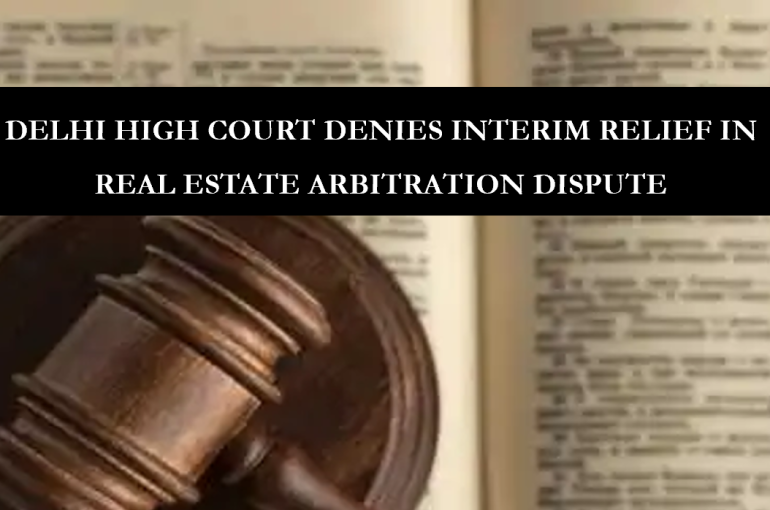DELHI HIGH COURT DENIES INTERIM RELIEF IN REAL ESTATE ARBITRATION DISPUTE
INTRODUCTION
A single-Judge bench of the High Court of Delhi comprising of Justice Neena Bansal Krishna passed an Order dated 10.06.2024 in Vijay Maheshwari Vs. Splendor Buildwell Private Limited and Anr. in O.M.P.(I) (COMM.) 42/2024 & I.As. 2446/2024, 4723/2024 and held that the Petitioner, Vijay Maheshwari, is not entitled to any relief under Section 9 of the Arbitration and Conciliation Act, 1996, as there was no prima facie evidence of a binding contract for assured returns and the Petitioner had already accepted refunds for the transaction.
FACTS
i) The Petitioner, Mr. Vijay Maheshwari had filed a case under Section 9 of the Arbitration and Conciliation Act, 1996 (Act) seeking ad interim Order restraining the Respondent No. 1, Splendor Buildwell Private Limited and Respondent No. 2, Ishayu Builders And Developers Private Limited from encumbering, selling, offering of sale, alienating, disposing off, transferring in any manner or creating a third party interest in the office spaces bearing No. 410, 411 and 412 located at “Spectrum One”, Sector-58, Golf Course Extension Road (“properties in question”).
ii) The Respondent No. 2 who is the owner of the land 6.755 acres situated in Sector-58 in the Revenue Estate of Behrampur, Tehsil Sohna and District Gurgaon, Haryana. (said land).
iii) The Petitioner, Vijay Maheshwari, had entered into tripartite Agreements with the Respondents for the purchase of three office spaces (Units 410, 411, and 412) located in the “Spectrum One” complex in Sector-58, Golf Course Extension Road, Gurgaon. The Agreements were signed on 05.03.2020, with a total payment of Rs. 77,85,000 towards these units. Alongside these Agreements, an unsigned Memorandum of Understanding (MoU) promised an assured rental return if the units were leased within six months.
iv) The Petitioner claimed that the Respondents failed to lease the units and provide the assured returns as promised. Despite paying Rs. 77,85,000, the Petitioner did not receive the signed MoU, which was critical for securing the assured returns. Consequently, the Petitioner sought the execution of the Conveyance Deed and the payment of unpaid assured returns, invoking arbitration for dispute resolution.
v) The Respondents countered, stating that the Petitioner had sought a refund and had received Rs. 77,85,000, comprising an initial sum of Rs. 20,00,000, followed by Rs. 10,00,000 and Rs. 47,85,000. They asserted that the Petitioner was not entitled to any further protection under Section 9 of the Arbitration Act.
HIGH COURT ANALYSIS
The High Court vide Order dated 10.06.2024, made the following observations:
1) The Single Judge emphasized that the scope of inquiry under Section 9 is limited to granting interim relief and cannot determine the final merits of the case, which falls under the jurisdiction of the Arbitral Tribunal. The Court found that there was no prima facie evidence of a concluded MoU, as the Petitioner himself acknowledged that the MoU was never signed. Therefore, the Claim for assured returns based on the MoU was not legally binding.
2) Additionally, the Petitioner had consistently sought a refund due to the lack of responses from the Respondents, especially during the COVID-19 Pandemic. The Court observed that the Petitioner had accepted the refunds without contesting the termination of the Agreement, indicating his intent to withdraw from the purchase rather than enforce the Conveyance Deeds.
3) The Court also highlighted that the Respondents had already sold two of the units and entered into an Agreement to sell the third, further complicating the Petitioner’s claims. Given these circumstances, the Court ruled that the Petitioner did not have prima facie right to restrain the Respondents from creating third-party interests in the units.
Conclusion
The High Court of Delhi after perusing all the facts and circumstances held that Petition under Section 9 of the Arbitration and Conciliation Act, 1996, was dismissed. The Petitioner was directed to pursue his claims through arbitration, where the Parties could raise their respective contentions.
Kartik Khandekar
Senior Associate
The Indian Lawyer & Allied Services





































Leave a Reply